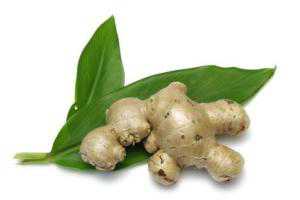姜根补充剂有助预防结肠癌
2012-03-09 MedSci MedSci原创
Ginger root 据美国癌症研究协会《癌症预防研究杂志》上发表的一项研究,姜根补充剂能降低结肠发生炎症时的相关标志物,这表明姜根补充剂有可能用于预防结肠癌。 美国密歇根大学医学院的助理教授、公共卫生硕士Suzanna M. Zick和他的同事招募了30名患者,并随机分成两组,一组给予安慰剂,一组给予两克姜根补充剂,两组都给予28天。 28天后,研究人员测量了结肠发生炎症反应时的标记物水

Ginger root
据美国癌症研究协会《癌症预防研究杂志》上发表的一项研究,姜根补充剂能降低结肠发生炎症时的相关标志物,这表明姜根补充剂有可能用于预防结肠癌。
美国密歇根大学医学院的助理教授、公共卫生硕士Suzanna M. Zick和他的同事招募了30名患者,并随机分成两组,一组给予安慰剂,一组给予两克姜根补充剂,两组都给予28天。
28天后,研究人员测量了结肠发生炎症反应时的标记物水平,结果发现绝大多数生物标记物都显着降低,在其他一些标记物中也呈现显着下降趋势。
Zick说:“以往研究已经证实炎症是结肠癌发生的前兆,但需要开展另一项试验研究探讨姜根补充剂对结肠癌发生风险的影响”。
Zick说:“我们应用同样的姜根补充剂进一步开展研究,以判定这一物质是否适用于其他临床试验研究”,她认为人们对姜根补充剂的关注度会越来越大,因为人们一直在寻找无毒、成本效益低、能提高生活质量的预防癌症方法。
Zick是传统医学教育中有关适当运用自然疗法、饮食、营养和其他替代疗法的四年制自然疗法医生(ND)。与135所传统医学学校所开展的研究项目相比,她的研究项目仅是全国8个研究项目中的一个。
这项研究由国家癌症研究所资助。(生物谷 Bioon.com)
Phase II Study of the Effects of Ginger Root Extract on Eicosanoids in Colon Mucosa in People at Normal Risk for Colorectal Cancer
Suzanna M. Zick, D. Kim Turgeon, Shaiju K. Vareed, Mack T. Ruffin, Amie J. Litzinger, Benjamin D. Wright, Sara Alrawi, Daniel P. Normolle, Zora Djuric, and Dean E. Brenner.
Inhibitors of COX indicate that upregulation of inflammatory eicosanoids produced by COX, and in particular prostaglandin E2 (PGE2), are early events in the development of colorectal cancer (CRC). Ginger has shown downregulation of COX in vitro and decreased incidence/multiplicity of adenomas in rats. This study was conducted to determine if 2.0 g/d of ginger could decrease the levels of PGE2, 13-hydroxy-octadecadienoic acids, and 5-, 12-, and 15-hydroxyeicosatetraenoic acid (5-, 12-, and 15-HETE), in the colon mucosa of healthy volunteers. To investigate this aim, we randomized 30 subjects to 2.0 g/d ginger or placebo for 28 days. Flexible sigmoidoscopy at baseline and day 28 was used to obtain colon biopsies. A liquid chromatography mass spectrometry method was used to determine eicosanoid levels in the biopsies, and levels were expressed per protein or per free arachidonic acid. There were no significant differences in mean percent change between baseline and day 28 for any of the eicosanoids, when normalized to protein. There was a significant decrease in mean percent change in PGE2 (P = 0.05) and 5-HETE (P = 0.04), and a trend toward significant decreases in 12-HETE (P = 0.09) and 15-HETE (P = 0.06) normalized to free arachidonic acid. There was no difference between the groups in terms of total adverse events P = 0.55). On the basis of these results, it seems that ginger has the potential to decrease eicosanoid levels, perhaps by inhibiting their synthesis from arachidonic acid. Ginger also seemed to be tolerable and safe. Further investigation in people at high risk for CRC seems warranted.
本网站所有内容来源注明为“梅斯医学”或“MedSci原创”的文字、图片和音视频资料,版权均属于梅斯医学所有。非经授权,任何媒体、网站或个人不得转载,授权转载时须注明来源为“梅斯医学”。其它来源的文章系转载文章,或“梅斯号”自媒体发布的文章,仅系出于传递更多信息之目的,本站仅负责审核内容合规,其内容不代表本站立场,本站不负责内容的准确性和版权。如果存在侵权、或不希望被转载的媒体或个人可与我们联系,我们将立即进行删除处理。
在此留言







